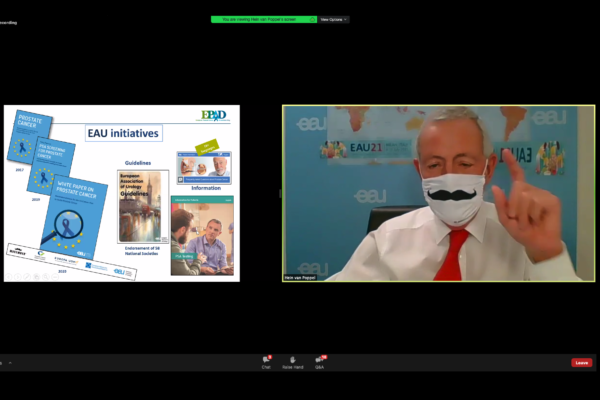Strong message from European Prostate Cancer Awareness Day event
Pressure for a Europe-wide programme of prostate cancer screening mounted at this year’s European Prostate Cancer Awareness Day (EPAD) meeting, with health professionals and patients alike quoting clear evidence that it will save lives.
According to Professor Monique Roobol from the Department of Urology at the Erasmus Medical Centre Rotterdam, the latest evidence from European trials indicates that prostate mortality rates could be reduced by up to 50% if PSA-based screening programmes are introduced.
“We now know that organised screening with the use of the PSA test reduces suffering and dying from prostate cancer,” said Professor Roobol at the online event, held by the European Association of Urology (EAU) with Europa Uomo and other organisations.
“Potential harms can be largely avoided. It is time to organise all relevant stakeholders and start implementing our knowledge to avoid further suffering and lives lost.”
Hein Van Poppel, EAU Adjunct Secretary General (pictured), said that times have changed since PSA screening was blamed for overdiagnosis and overtreatment. The use of risk calculators, MRI scans before biopsy and the application of active surveillance had all changed the equation.
Now the new EU Cancer Plan had to take account of the evidence, he said. Testing could be effectively implemented using risk calculators, PSA tests and multiparametric MRI – and then a biopsy only for those found to be at risk of significant cancer.
“This is our recommendation to the EU Cancer Plan,” he said. “If they do not take into account the most common cancer in men, the second most lethal cancer in men, then it is really not fair.”
Europa Uomo Chairman André Deschamps presented findings from the EUPROMS study demonstrating that quality of life is worse in the later stages of prostate cancer – emphasising the importance of early detection to maintain quality of life. He urged action.
"Do not forget that men die from prostate cancer, 107,000 in Europe each year," he said. "Men suffer from prostate cancer. And policy makers please you must change that."
